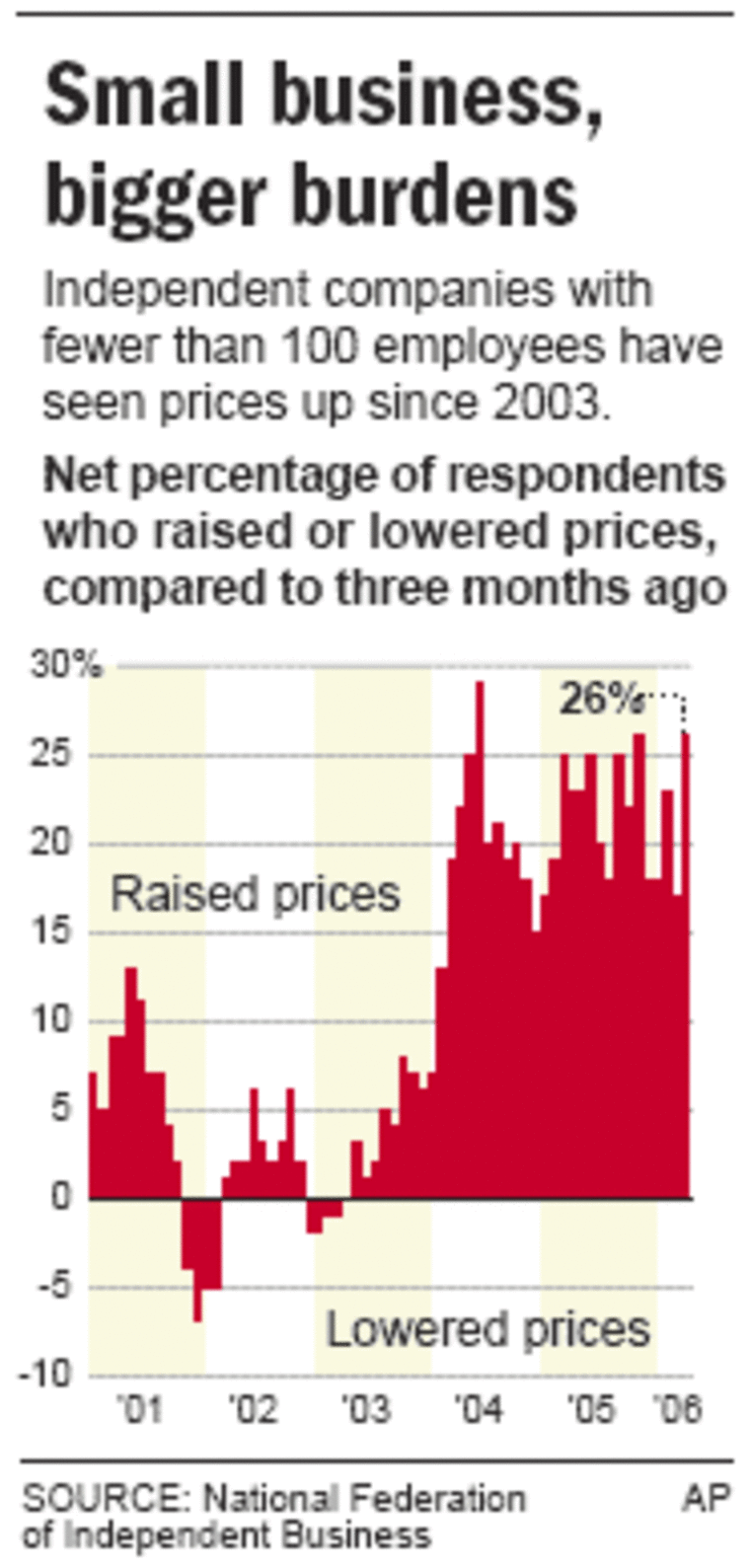These are uneasy times for many small business owners — with the cost of almost everything they buy ratcheting higher, they’re being forced to take the anxiety-provoking step of raising their own prices.
At Joseph Ferruzzi Associates Inc., a New York-based design and printing company, President Joe Greco has been contending with a series of price increases and surcharges for paper and delivery services. He can’t absorb it all.
“The bills are going through the roof,” Greco said. “Any out-of-pocket money has to be passed on.”
So Greco has been alerting clients, who range from other small businesses to larger companies, that they’ll need to pay more.
So far this year, inflation as measured by the government’s consumer price index is rising at an annual rate of 5.1 percent, way above the 3.4 percent increase for all of 2005. What’s known as core inflation, which excludes energy and food prices, is up at a rate of 3 percent, ahead of last year’s 2.2 percent.
But while higher energy and raw materials costs and rising interest rates have been grabbing the headlines this year, owners say they’re feeling the effect of inflation throughout their businesses.

“Our costs for everything have gone up — the biggest issue is the cost of health care,” said Brian Drum, CEO of Drum Associates, a New York-based executive recruiter.
“When health care is going up in the double digits for the last three or four or five years, that gets very hard to manage,” he said. Like other employers, Drum has had to change health plans and the amount of coverage he provides, and ask employees to pay more for their health care.
“But we’re still paying a significant increase,” he said.
Drum said his company has raised some of its consulting rates because of inflation pressures.
Raising prices is a difficult process for many small businesses. Every increase potentially makes them less competitive, and raises the possibility that customers might go elsewhere.
Some “start to think you’re gouging them. They start to look for other people” to do the job, Greco said.
But a big consolation for Greco and many other owners is that their customers generally understand the situation, and don’t gripe too much about the increases. “Most of our clients are saying, Joe, there’s nothing you can do, and nothing we can do,” he said.
Small businesses are particularly vulnerable to inflation because they lack the economy of scale of larger companies.
Brian Eberle said the rising cost of fuel is the biggest problem for his New York-based recycled office furniture business, Green Office Systems, forcing him to pass on delivery surcharges to customers.
“They completely understand it,” he said of customers, and estimated that only about 2 percent of them complain about the added costs.
But there can be a flip side to that understanding — many customers are taking longer to pay those higher bills. That eats into cash flow, and Greco said that means he sometimes needs to pay his bills with credit cards.
“I’m losing a lot of sleep — I wake up thinking about it,” Greco said.
While raising prices does make individual business owners nervous, particularly if they’re in a highly competitive industry, economists say companies overall do have room to nudge their prices higher.
“The only thing that gives you pricing power is strong demand,” said William Dunkelberg, chief economist with the National Federation of Independent Business, a Washington D.C.-based advocacy group. “Demand is strong, so you can raise your prices. You might lose a customer or two, but I don’t know where they’re going to go because everyone has the same price.”
The recruiting business does well when the economy is stronger, Drum said, because executives command higher salaries and so recruiters’ fees, which are a percentage of those salaries, go up. But if the economy slows and inflation rises, “we end up paying more for stuff and doing less business,” he said.
The NFIB, which each month surveys the small businesses that comprise its membership, has reported an upward trend in the number of companies raising their prices or reporting plans to raise prices. In April, 26 percent of the respondents said they raised their prices, up 9 percentage points from March. Price increases were particularly prevalent in the construction industry, where a surge in raw materials costs prompted 45 percent of the surveyed companies to raise their prices.
Business owners naturally look to cut costs wherever they can in hopes of avoiding price increases. Drum said his company is cutting back on travel plans.
But there are limits to how much they can cut. As Greco put it, “we do what we can internally, but at what point does that change, because everything we buy is going up.”
